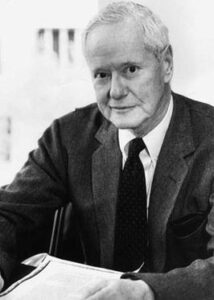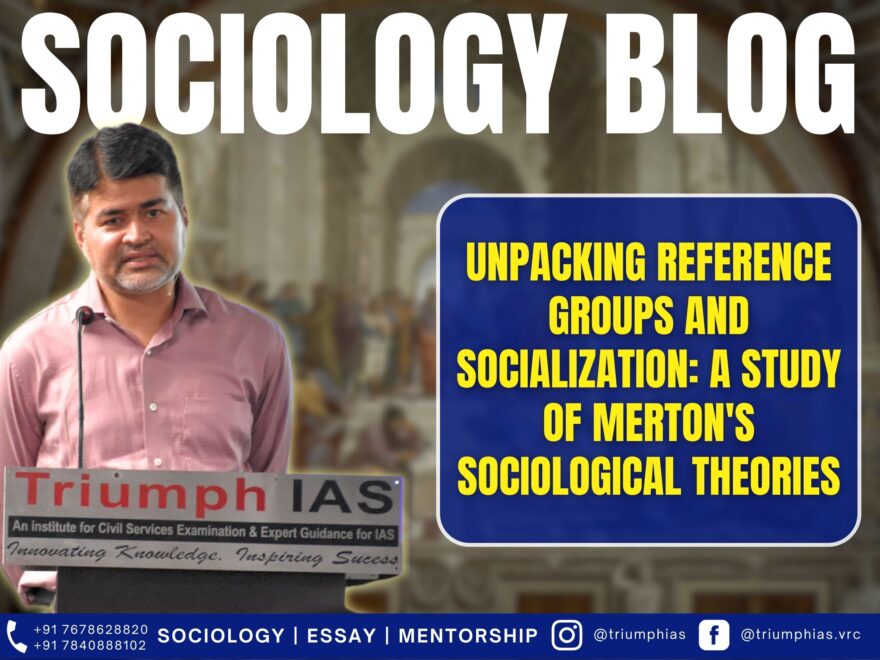
“The light of truth burns
without a flicker in the depths
of a house that is shaken
with storms of passion and fear.”
Reference Group
Relevant for Sociology Paper-1 (Unit-4)

A reference group serves as a point of comparison for evaluating one’s achievements, role performance, aspirations, and ambitions. It is through the feedback and judgment of a reference group that individuals can determine whether their actions are deemed right or wrong, and whether they are performing poorly or well.
Therefore, it can be argued that the membership groups to which an individual belongs can function as their reference groups.
- Even groups to which you do not belong, known as non-membership groups, can function as reference groups. This is not surprising since life is dynamic, and you often become aware of the lives and ways of those outside your own group. This can lead to feelings of curiosity and questioning why others seem to possess more power or prestige than you do.
- Through this comparison, a sense of deprivation can arise. You may aspire to join a group that is more powerful or prestigious than your current one. Consequently, you may refer to a non-membership group to evaluate your achievements, performance, and progress. Hence, not only membership groups but also non-membership groups can act as reference groups. Humans perceive themselves not solely through the perspective of their own group members but also through the eyes of those belonging to other groups.
- Merton’s understanding of relative deprivation is closely connected to his examination of reference group behavior. In his analysis of “The American Soldier,” published in 1949, Merton explores how American soldiers viewed themselves and assessed their role performance and career accomplishments. For example, comparing himself to unmarried soldiers in the army, a married soldier may perceive that the induction into the army demanded greater sacrifices. Conversely, comparing himself to married soldiers, he may feel that he has been called upon to make sacrifices that unmarried soldiers have entirely avoided. This forms the essence of what Merton refers to as relative deprivation.
- This is not surprising as happiness or deprivation are not absolute concepts; they depend on the scale of measurement and the frame of reference. The married soldier is not focused on what he and other married soldiers receive; rather, he considers what he is deprived of. In comparison, his unmarried associates in the army enjoy relative freedom as they do not have the responsibilities that married soldiers cannot escape. In other words, married soldiers experience deprivation in terms of the freedom that their unmarried counterparts enjoy. Similarly, the married soldier may feel deprived when comparing himself to a civilian married friend who can live with their spouse and children, fulfilling their responsibilities. The married soldier feels deprived because, as a soldier, they cannot experience the everyday family life of a civilian.
- The sense of deprivation that the married soldier experiences is precisely due to the reference group against which he measures his own circumstances. Similarly, another finding indicates that overseas soldiers, compared to those stationed at home, face a greater disruption in their ties to home and the amenities of life they were accustomed to.

Concept of Group Membership & group Non-Membership
- Merton discusses three key characteristics of groups and group memberships:
- Firstly, there is an objective criterion, which is the frequency of interaction. In other words, a sociological understanding of a group refers to a collection of individuals who interact with each other on a regular basis.
- The second criterion is that the individuals involved define themselves as members. They perceive themselves as part of the group and adhere to shared expectations and norms of interaction that they consider morally binding for themselves and other members.
- The third criterion is that these individuals are recognized by others as belonging to the group. This recognition can come from both fellow members and non-members.
- Membership in a group significantly influences an individual’s day-to-day behavior in a clear and tangible manner. Group members are aware of their roles and responsibilities, and they understand the expectations placed upon them. Consequently, group norms hold moral significance for them.
- At this point, Merton wants us to recognize the dynamics of non-membership. While non-members do not meet the criteria of interaction and identification as members, Merton emphasizes that all non-members are not the same. Broadly speaking, non-members can be categorized into three groups:
- Some individuals aspire to gain membership in the group, indicating a desire for affiliation. Others may be indifferent to such group membership, displaying no particular inclination towards joining. There are also those who actively choose to remain unaffiliated with the group, expressing motivation to stay separate from its influence.
Anticipatory Socialization:
- Merton discusses the concept of anticipatory socialization in relation to non-membership reference groups. This refers to the process of preparing oneself for a group that one aspires to join but is not currently a part of. It involves adopting the values and lifestyles associated with the desired non-membership reference group. According to Merton, anticipatory socialization can serve two functions for an individual: aiding their ascent into the desired group and facilitating their adjustment after becoming a member.
- For instance, let’s consider a village boy from a lower middle-class background who sees the boys from Indus World School as his reference group. Through anticipatory socialization, he begins to imitate the smartness and behavior of these boys. If he successfully gains entry into Indus World School, his anticipatory socialization would prove beneficial as it would ease his adaptation to his new role.
- However, Merton acknowledges that anticipatory socialization can also have negative consequences. If the system is highly closed, the lower middle-class village boy may never have the opportunity to enter a prestigious school like Doon School. In such a case, anticipatory socialization would be detrimental to him. There are two reasons for this: firstly, he would fail to become a member of the desired group, and secondly, due to his imitation of the values of a non-membership group, he may be disliked by members of his own group. Merton refers to this situation as being reduced to a “marginal man.” Therefore, anticipatory socialization is only functional for individuals within a relatively open social structure that allows for mobility. In contrast, it becomes dysfunctional in a relatively closed social structure.
- Merton also highlights an interesting point. In a closed system, individuals are less likely to choose a non-membership group as their reference group. In such a system, where the rights, privileges, and obligations of each social stratum are considered morally right, even individuals with unfavorable objective conditions may feel less deprived. This is observed among groups like untouchables, scheduled castes, and tribes in India. However, in an open system, where individuals constantly compare themselves with relatively better-off and more privileged non-membership reference groups, they may experience perpetual unhappiness and discontent.
Positive and Negative Reference
Groups
- According to Merton, reference groups can be categorized into two types. Firstly, there is the positive reference group, which is admired and taken seriously to shape behavior and assess personal achievements and performance. Secondly, there is the negative reference group, which is disliked and rejected, and instead of providing norms to follow, it inspires the creation of counter-norms.
- Merton explains that the positive reference group involves willingly adopting the group’s norms or standards as a basis for self-evaluation. On the other hand, the negative reference group involves actively rejecting the norms and forming opposing norms.
- An example that comes to mind is the reaction of the colonized people towards their colonial masters. Some individuals may become enthralled by the success of the colonizers and start emulating their lifestyle, language, and even dietary habits. For them, the colonizers serve as a positive reference group.
- Conversely, there are those who despise the colonizers for their exploitation, arrogance, and brutality. Rather than imitating their norms, these individuals develop counter-norms to distinguish themselves from the colonizers. The colonizers act as a negative reference group for them.
Additionally, Merton introduces the concept of a self-fulfilling prophecy. He defines it as a false understanding of a situation that is believed to be accurate. Despite its inaccuracy, individuals behave as if the false definition is true. As a result, their behavior elicits responses that confirm the false definition. Merton suggests that this cycle of self-fulfilling prophecies can be broken by abandoning the initial definition that set it in motion. By questioning and introducing a new definition, the situation can be rectified.
To master these intricacies and fare well in the Sociology Optional Syllabus, aspiring sociologists might benefit from guidance by the Best Sociology Optional Teacher and participation in the Best Sociology Optional Coaching. These avenues provide comprehensive assistance, ensuring a solid understanding of sociology’s diverse methodologies and techniques
Reference groups, Membership groups, Non-membership groups, Anticipatory socialization, Positive reference group, Negative reference group, Self-fulfilling prophecy, Robert K. Merton, Social structure, Group norms, Relative deprivation, Social behavior
Follow us :
🔎 https://www.instagram.com/triumphias
🔎https://www.youtube.com/c/TriumphIAS
https://t.me/VikashRanjanSociology
Find More Blogs
|
Scope of the subject and comparison with other social sciences |
|||
|
|
|
|
Modernity and social changes in Europe |

